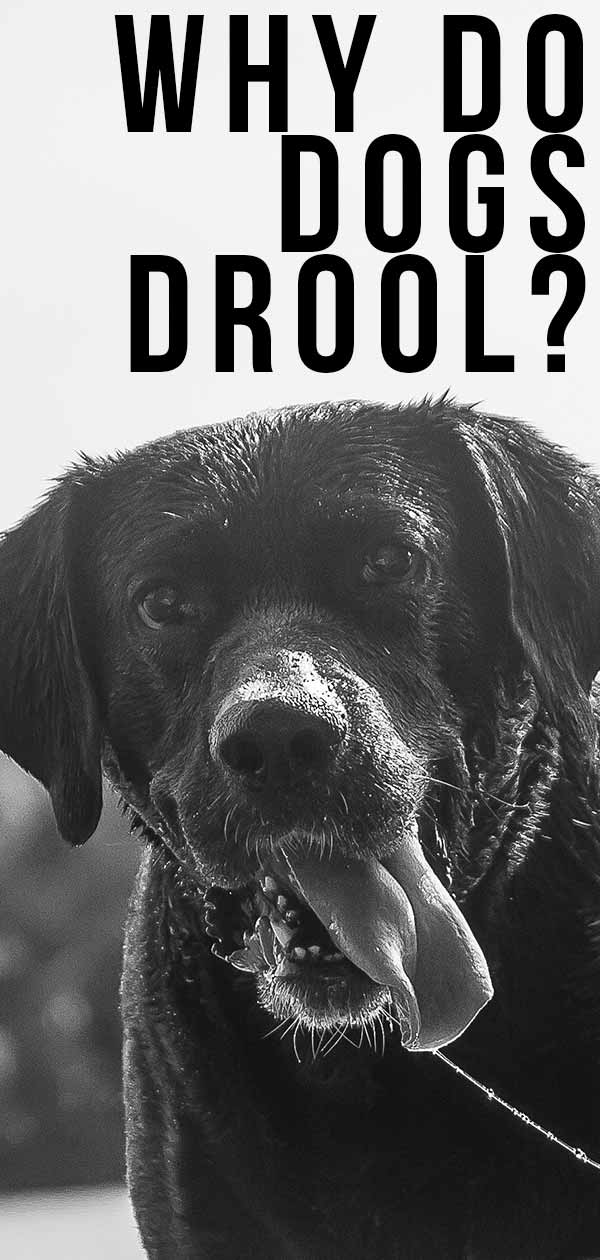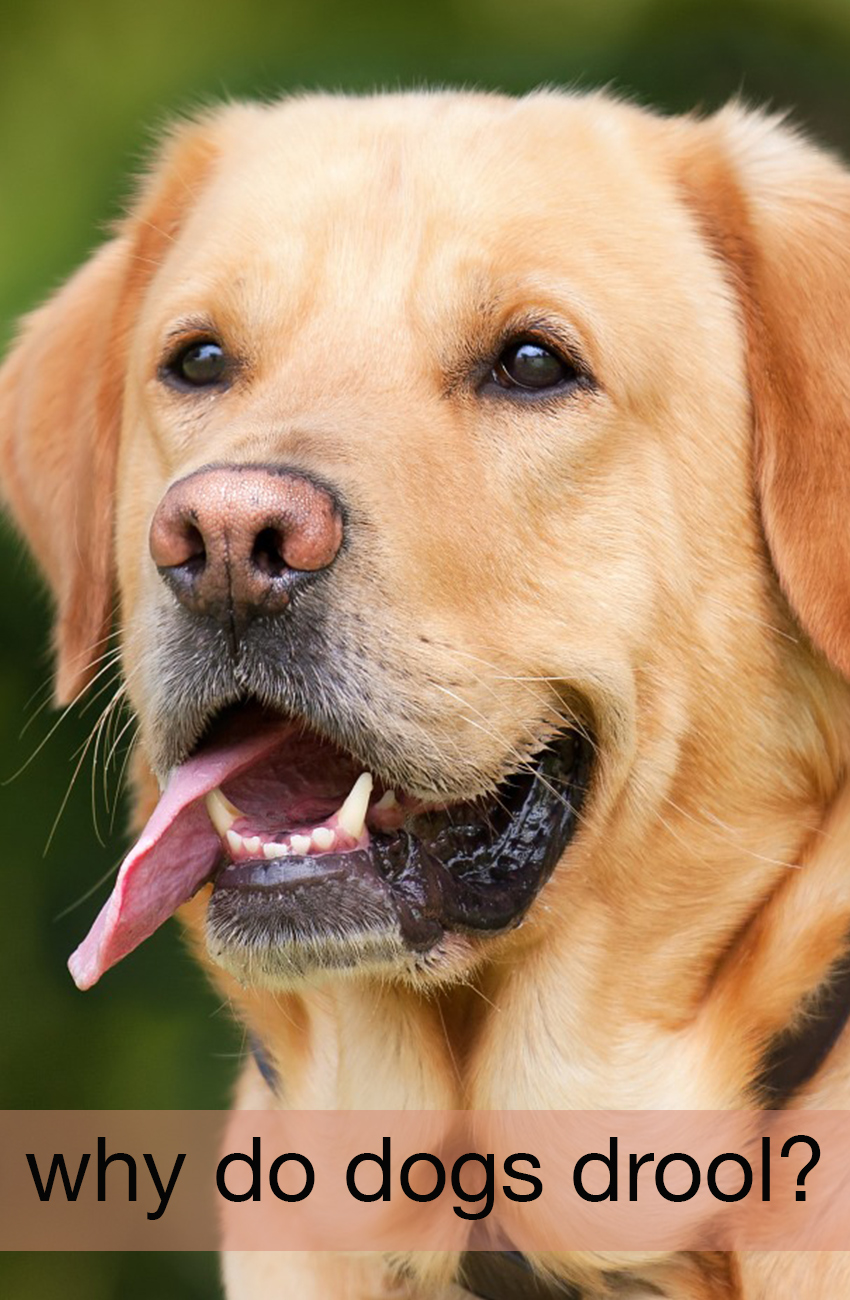Why Do Dogs Drool?
All dogs drool sometimes, and although my Labradors haven’t been very drooly in general they are more the exception than the rule.
Dog drool keeps the mouth moist and helps to prevent tooth decay and gum disease. It’s 98% water but also contains various enzymes, proteins, minerals and antibacterial compounds. The average dog produces lots of slightly sticky saliva when they are about to eat, as it helps to break down food and swallow crushed bones safely.
Saliva comes from glands that open through ducts into the dog’s mouth. The signal for the glands to start producing more saliva come from the dog’s brain in response to a number of different triggers. Dogs usually simply swallow any saliva they produce, but what we generally call drool is when it overflows out the mouth becoming visibly apparent.
Contents
- Why do dogs drool?
- Excessive drooling triggered by food.
- Anxiety, motion sickness and dental problems.
- Why is my dog drooling?
Why do dogs drool?
Dog drooling happens for several reasons.
- Either the dog’s mouth is trapping normally produced saliva, and releasing it all at once in a rush.
- Or the dog’s glands are making an abnormal amount of saliva (hypersialosis)
- Or, the dog is having trouble swallowing a normal amount of saliva (pseudoptyalism)
Excessive drooling from either of the last two reasons are seen to be abnormal and vets refer to this as ptyalism. The first of the three reasons is not usually a cause for concern, we tend to think of it as ‘normal’ drooling, and it tends to be breed related.
Why does my dog drool all the time?
Wolves and other wild dogs don’t normally drool. Dog with faces that are still ‘wolf shaped’ don’t normally drool. The main ‘normal’ drooling offenders in the dog world, are those who have been bred with loose, jowly faces – like Bloodhounds, Mastiffs and St Bernard’s. Think of ‘Beethoven’, the St. Bernard, in the classic nineties film. The movie delights in showing a slow motion view of the drool flicking around his face.
The reason for slobbering in dogs with loose soft jowls is that the skin folds form pockets around their mouths.These pockets trap the saliva which then overflows when they’re filled to the brim. Unfortunately, there isn’t a lot you can do about this. Other than keeping a towel handy. Constant drooling does keep your dog’s lips and the skin around their mouth wet all the time and this can cause irritation and inflammation.
Fortunately, Labradors do not in general have a big problem with this. Although some do have a looser facial skin structure than others. But for the most part, if a Labrador starts drooling, it needs a little investigation. There are both physical and psychological reasons why dogs drool and it’s important that we make sure our drooling dog doesn’t have a problem. Let’s have a look at the triggers of ‘normal’ drooling in dogs.
Food triggers dog drooling
The most common reason, and one that many Labrador owners will be familiar with, is the anticipation of food! We’ve already seen that dogs produce a lot of saliva while eating. This helps everything to slip down nicely and for digestion.
Anticipation of food is a psychological trigger for the production of saliva. For us as well – but dogs seem to be better at it. This was probably the reason why Pavlov used dogs for his famous stimulus response experiments. He measured the amount of saliva produced by dogs after he trained them to associate a ticking metronome with food.
In the same way, your dog hears you getting his bowl out, he hears food being tipped into it. Then you expect him to sit and wait before tucking in! All that anticipation sets those salivary glands into full swing. The results may be enough liquid to spill from the sides of your dog’s mouth.

Dogs drool when anxious
Dogs that are anxious, nervous or even excited may pant and drool. You can recognise anxious drooling by looking for other signs of stress as well, such as panting, pacing, whining, barking, and shaking off. Riding in cars can trigger drooling in some dogs, partly from anxiety and partly through motion sickness.
Dog drooling from motion sickness
It can be hard to separate anxiety from actual motion sickness. Some dogs don’t do well travelling in cars. They might be very happy to know that they’re going for a walk, but the motion of the vehicle disagrees with them. Not all dogs who get travel sick will vomit or mess in the car. Some might just drool.
If you are worried that your Labrador is suffering from travel sickness, there are things you can do to help him. Take a look at this helpful article on Travel Sickness in Labradors to find out more. Once your dog is feeling better, he’ll probably drool less as a result.
But what if your dog is drooling today and he wasn’t drooling yesterday. Chances are that something is wrong. Because saliva is linked to the mouth this is the first place to look for the cause of your dog drooling a lot suddenly.
Mouth problems that cause dog drooling
Problems in their mouths that can cause excessive drooling in dogs are:
- Dental problems. Like build-up of plaque on his teeth and gums, a dental abscess or a broken tooth. Keep in mind that puppies could also drool when they lose their baby teeth.
- Infection. Usually seen as redness and swelling inside the dog’s mouth.
- A foreign object. Like a stick, bone chip or a piece from a plastic toy stuck between the dog’s teeth, in their gum, palate or even under their tongue.
- Injuries. Cuts, scrapes or bites.
- An abnormal growth the dog’s mouth.
- An abscess or other condition affecting the salivary glands.
A further sign that your pup might have a mouth problem is when the paw at their face. You may even notice that they are chewing only on one side of their mouth or refuse their dry kibble while still eating soft food. Or they might not eat at all. So the first thing you should do when you notice that your dog is drooling more than usual is to have a good look inside their mouth. Also check if your dog’s saliva is normal. Is it maybe foul smelling, thicker, foaming, or is there blood in it.
Take your pup to the vet if they won’t let you check their mouth or if you find anything that’s unusual and worrying. You might be able to remove a foreign object yourself. But look carefully whether there are any injuries and keep an eye over the next few days. A small injury could become infected or you might have missed a painful crack in a tooth – at the back or at the gumline.
Another common cause of dog drooling is when they’re too hot – panting and with their mouths open. Overheating could progress to heatstroke very quickly.
Heatstroke
Dogs can and do suffer from heatstroke, and it’s a medical emergency. Short nosed breeds, like boxers, bulldogs and pugs are especially vulnerable to heat stroke. With their short faces they’re unable to pant and cool off effectively. So when it’s very hot and your dog is drooling they may be overheating. Take steps to cool them down while you phone your vet for instructions.
Always make sure that your pet has shade and plenty of water in hot weather. We’ve had a look the usual reasons why dogs might be drooling. However, there are many other, less obvious, causes of excessive drooling in dogs.
More potential causes
With these conditions your dog might start drooling a lot suddenly or, especially in the case of more serious illness, it might build up over time.
- Allergies and infections. Conditions that affect your pup’s nose, throat or sinuses can make it difficult for them to swallow, and then they drool.
- Rabies. This is a serious infection where one of the main signs is drooling, even foaming at the mouth.
- Poisoning. Dogs can be poisoned in different ways. Even by eating common plants like azaleas or chrysanthemums. They could also be poisoned by chemicals such as pesticides you use in your garden or household cleaners.
- Upset stomach. Anything that causes stomach pain, and/or diarrhea and vomiting is usually accompanied by drooling.
- Liver and kidney diseases.
- Disorders of the nervous system, especially those that affect the muscles.
Dog drooling diagnosis and treatment
You vet will examine your dog for the cause of excessive salivation – probably starting with the mouth. If he doesn’t find the cause there he’ll need to do further tests and examinations to get to the root of the problem. He might even suggest blood or urine tests, biopsies, X-rays or scans. Once the vet finds the cause of your dog drooling they’ll discuss treatment options with you and help you decide on the best course of action.


Free Labrador Updates!
Get my training tips, news, reviews, and the latest from The Labrador Site delivered to your inbox



One of the labs we rescued was a drooler. At first, we thought it was due to nerves, but our vet told us he was a wet mouth lab and nothing we could do about it. We learned to laugh at our walls. In the end he died way to early from cancer.
Thank you for this article. We have two female black lab mix dogs who mysteriously showed up in our yard about 6 years ago (we believe they were about a year old). Their thin, bony bodies and extreme shyness made it painfully obvious that someone had mistreated them. It took months for them to trust us, even a little. Today, both girls are so loving! One sleeps in our bed while the other sleeps in her bed next to mine and both love to sit on the furniture with us. They are both wonderful and help to complete our family! One is a little overweight, but she is extremely active, running and jumping every day. The thin one is small boned and we believe she may have been the runt of the litter. This girl drools nearly all of the time and has always done so! After reading this article I believe it may be due to her anxiety/nervousness. Loud noises of any kind especially thunder or raised voices make her run for cover. She has a hard time if I leave home for a weekend or longer. Just to be safe I will ask the vet if he thinks there might be a health reason. She has begun filling in her frame in the last year so I don’t really think it’s a physical issue.
Hi,
Really liked the article. My boy Jett (7 years old) is a big headed lab with jowls and since Christmas he’s like a leaky tap. We took him to the vet and he couldn’t find anything wrong with him. He checked his mouth, ears, eyes, felt his tummy and temperature… He acting, playing, eating and pooping as normal. Do you think I should get a second opinion or is this a fairly normal thing as dogs age? I’ve always liked my vet and have been going there for years… Could our boy just be a crazy little drooler now?